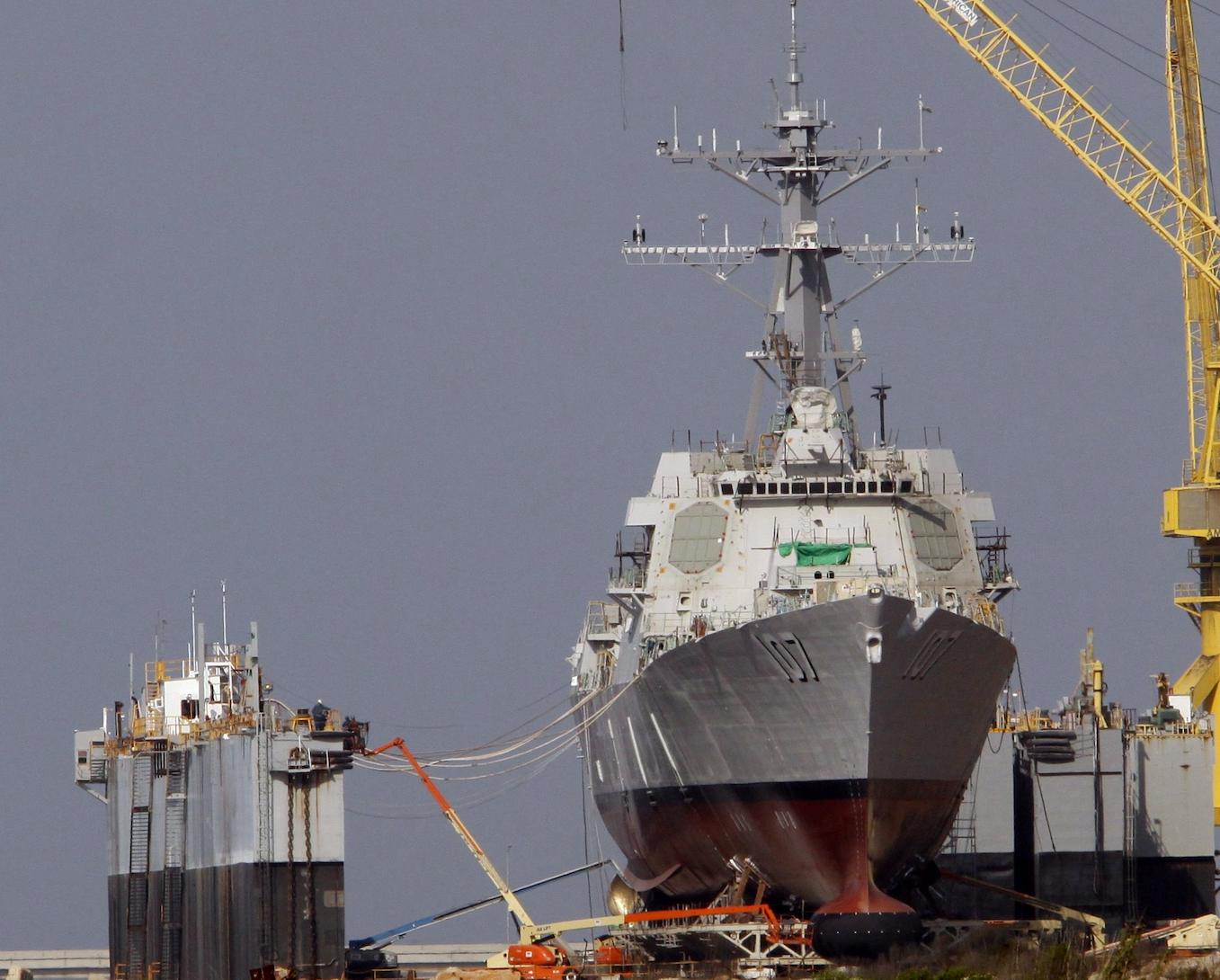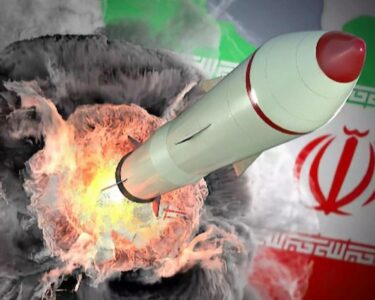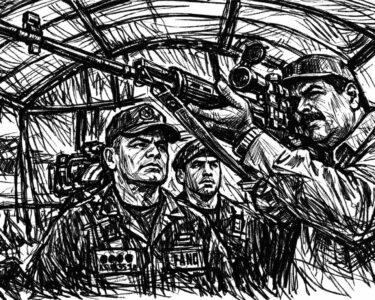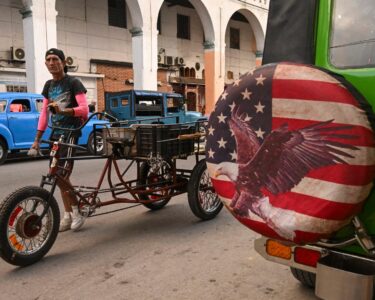The guided-missile vessel is participating in military exercises with the Trinidad and Tobago military as President Donald Trump intensifies the siege of the Cartel of the Suns.
The morning sun had barely lifted over Port of Spain when the silhouette of the USS Gravely cut across the Gulf of Paria. Dockworkers paused to watch the guided‑missile destroyer glide into the harbor, its gray hull dwarfing the fishing boats moored nearby. Officially, the visit was a “routine port call.” Unofficially, it was a message—one aimed squarely at Caracas, and at the shadowy networks Washington calls the Cartel de los Soles.
For U.S. officials, the destroyer’s presence is part of a broader campaign against transnational narcotics flows. The Caribbean remains a vital corridor for cocaine shipments, and the Gravely’s advanced systems—Aegis radar, vertical launch cells, anti‑submarine warfare—are framed as tools of deterrence and interdiction.
The exercises with Trinidad and Tobago are presented as capacity‑building: professional exchanges that strengthen regional partners against trafficking networks. Yet the scale of the deployment, including the nearby Gerald R. Ford carrier group, suggests a message that goes beyond training.
For Washington, the message was clear: the Caribbean is not a permissive environment for transnational narcotics networks, particularly those allegedly tied to Venezuela’s security establishment.
Trinidad & Tobago’s government emphasized the professional dimension of the visit: training, logistics, and defense cooperation. Yet the suspension of commercial berths and the visibility of a U.S. destroyer in the capital’s harbor underscored the geopolitical weight of the docking. For a small Caribbean state, the challenge is balancing economic pragmatism—energy ties with Venezuela, trade with the U.S.—with security partnerships that inevitably carry political overtones.
Trinidad and Tobago’s Balancing Act
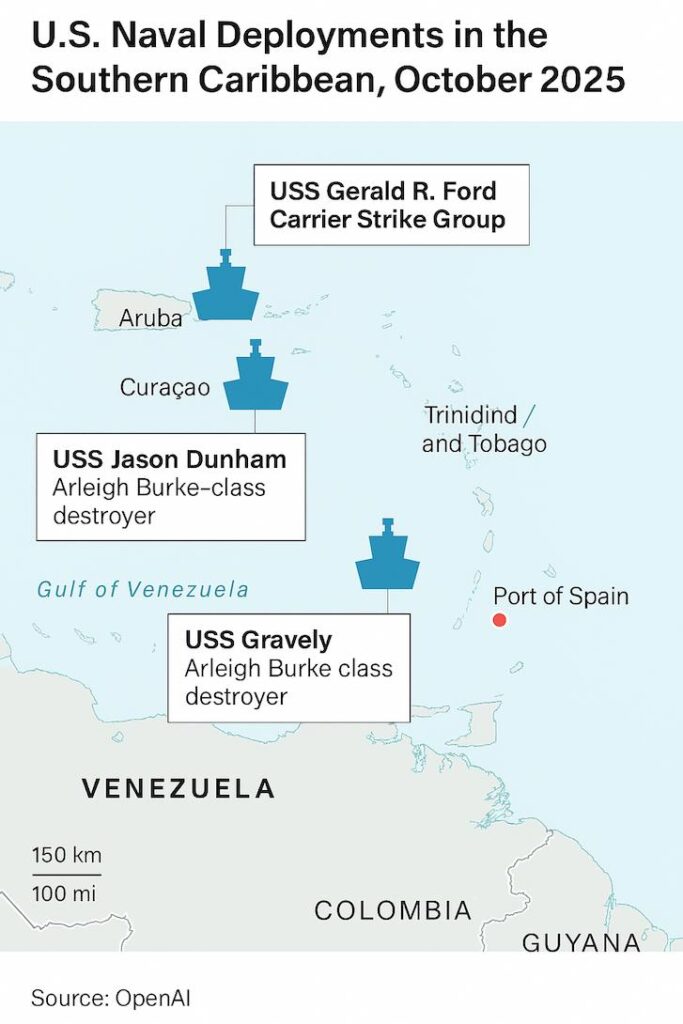
For Port of Spain, the docking was framed as a professional exchange: joint infantry drills, maintenance workshops, and medical training. Officials emphasized bilateral cooperation, careful not to appear entangled in Venezuela’s disputes.
Yet the suspension of commercial berths and the visibility of a U.S. destroyer in the harbor underscored the delicate balance small Caribbean states must strike between economic pragmatism and security partnerships.
For Port of Spain, the docking was framed as professional cooperation. The Ministry of National Security emphasized training and logistics, careful to avoid entanglement in Venezuelan disputes. Yet the suspension of commercial berths and the visibility of a U.S. destroyer in the harbor underscored the geopolitical weight of the visit.
Caribbean states like Trinidad and Tobago walk a fine line: dependent on U.S. security partnerships, but economically and geographically tied to Venezuela. Each port call becomes a balancing act between neutrality and alignment.
Media outlets and analysts aligned with Washington explicitly link the naval deployment to the intention of pressuring the drug trafficking networks known as the Cartel of the Suns, supposedly operating under the protection of senior Venezuelan military commanders. Spanish-language press (Heraldo USA, Informe Orwell) highlights that the mission of the destroyers—Gravely, Jason Dunham, and Sampson—is presented as aimed at confronting the Cartel of the Suns and “drug trafficking linked to the Maduro regime.”
The deployment has not gone unnoticed elsewhere in the Caribbean. Barbados expressed concern over the “menacing military presence” of U.S. forces, while other governments quietly welcomed the show of strength against trafficking. The region’s fragmentation mirrors the international split over Venezuela’s legitimacy: no consensus, only competing imperatives.
In Port of Spain, the US presence off the Venezuelan coast is a topic of conversation on the streets: “There’s a good reason they’re bringing their warship. To help clean up the drug problems in Venezuelan territory,” says Lisa, a 52-year-old office worker who prefers not to give her last name.
Caracas Responds: Siege Narrative and Legitimacy Crisis
From Caracas, the optics are starkly different. Maduro denounced the docking as an act of aggression, portraying it as part of a U.S. strategy to destabilize Venezuela. State media amplified this line, warning of “imperial encirclement.”
But the naval deployment intersects with a deeper crisis: Maduro’s contested legitimacy. After the July 2024 election, he refused to publish the full tally sheets, while opposition candidate Edmundo González released thousands of actas showing a clear victory. International recognition fractured—several governments acknowledged González, while others maintained ties with Maduro. The result is a presidency sustained by institutional control but lacking broad legitimacy.
Against this backdrop, the Gravely’s presence is not just military pressure; it is a reminder of the political fragility of the Venezuelan state.
The Cartel de los Soles: Judicial Weight
- Origins: The term emerged in the 1990s, referring to Venezuelan National Guard officers (whose insignia bears suns) accused of facilitating cocaine shipments.
- Judicial standing: U.S. indictments and sanctions have named senior Venezuelan officials, alleging direct involvement in trafficking. Rewards have been offered for their capture.
- Structure: Analysts debate whether the cartel is a centralized organization or a loose constellation of military patronage networks. What is not in dispute is that Washington treats it as a strategic adversary.
- By invoking the Cartel de los Soles, the U.S. frames its naval deployments not as abstract deterrence but as targeted pressure against state‑protected criminality.
Timeline of Events
- October 26, 2025 – USS Gravely docks in Port of Spain.
- October 27–29 – Joint exercises with TTDF: infantry tactics, maintenance workshops, medical drills.
- October 28 – Nicolás Maduro denounces the deployment as “a provocation designed to fabricate an eternal conflict.”
- October 30 – Scheduled departure of the Gravely, coinciding with reports of the USS Gerald R. Ford carrier group maneuvering closer to Venezuelan waters.
The destroyer’s gray hull in Port of Spain thus embodies a paradox—at once a symbol of maritime security and a reminder of unresolved political and criminal entanglements that extend far beyond the harbor.


